Alper Güngör
Bayesian Conditioned Diffusion Models for Inverse Problems
Jun 14, 2024



Abstract:Diffusion models have recently been shown to excel in many image reconstruction tasks that involve inverse problems based on a forward measurement operator. A common framework uses task-agnostic unconditional models that are later post-conditioned for reconstruction, an approach that typically suffers from suboptimal task performance. While task-specific conditional models have also been proposed, current methods heuristically inject measured data as a naive input channel that elicits sampling inaccuracies. Here, we address the optimal conditioning of diffusion models for solving challenging inverse problems that arise during image reconstruction. Specifically, we propose a novel Bayesian conditioning technique for diffusion models, BCDM, based on score-functions associated with the conditional distribution of desired images given measured data. We rigorously derive the theory to express and train the conditional score-function. Finally, we show state-of-the-art performance in image dealiasing, deblurring, super-resolution, and inpainting with the proposed technique.
CalibFPA: A Focal Plane Array Imaging System based on Online Deep-Learning Calibration
Sep 20, 2023Abstract:Compressive focal plane arrays (FPA) enable cost-effective high-resolution (HR) imaging by acquisition of several multiplexed measurements on a low-resolution (LR) sensor. Multiplexed encoding of the visual scene is typically performed via electronically controllable spatial light modulators (SLM). An HR image is then reconstructed from the encoded measurements by solving an inverse problem that involves the forward model of the imaging system. To capture system non-idealities such as optical aberrations, a mainstream approach is to conduct an offline calibration scan to measure the system response for a point source at each spatial location on the imaging grid. However, it is challenging to run calibration scans when using structured SLMs as they cannot encode individual grid locations. In this study, we propose a novel compressive FPA system based on online deep-learning calibration of multiplexed LR measurements (CalibFPA). We introduce a piezo-stage that locomotes a pre-printed fixed coded aperture. A deep neural network is then leveraged to correct for the influences of system non-idealities in multiplexed measurements without the need for offline calibration scans. Finally, a deep plug-and-play algorithm is used to reconstruct images from corrected measurements. On simulated and experimental datasets, we demonstrate that CalibFPA outperforms state-of-the-art compressive FPA methods. We also report analyses to validate the design elements in CalibFPA and assess computational complexity.
DEQ-MPI: A Deep Equilibrium Reconstruction with Learned Consistency for Magnetic Particle Imaging
Dec 26, 2022Abstract:Magnetic particle imaging (MPI) offers unparalleled contrast and resolution for tracing magnetic nanoparticles. A common imaging procedure calibrates a system matrix (SM) that is used to reconstruct data from subsequent scans. The ill-posed reconstruction problem can be solved by simultaneously enforcing data consistency based on the SM and regularizing the solution based on an image prior. Traditional hand-crafted priors cannot capture the complex attributes of MPI images, whereas recent MPI methods based on learned priors can suffer from extensive inference times or limited generalization performance. Here, we introduce a novel physics-driven method for MPI reconstruction based on a deep equilibrium model with learned data consistency (DEQ-MPI). DEQ-MPI reconstructs images by augmenting neural networks into an iterative optimization, as inspired by unrolling methods in deep learning. Yet, conventional unrolling methods are computationally restricted to few iterations resulting in non-convergent solutions, and they use hand-crafted consistency measures that can yield suboptimal capture of the data distribution. DEQ-MPI instead trains an implicit mapping to maximize the quality of a convergent solution, and it incorporates a learned consistency measure to better account for the data distribution. Demonstrations on simulated and experimental data indicate that DEQ-MPI achieves superior image quality and competitive inference time to state-of-the-art MPI reconstruction methods.
Unsupervised Medical Image Translation with Adversarial Diffusion Models
Jul 17, 2022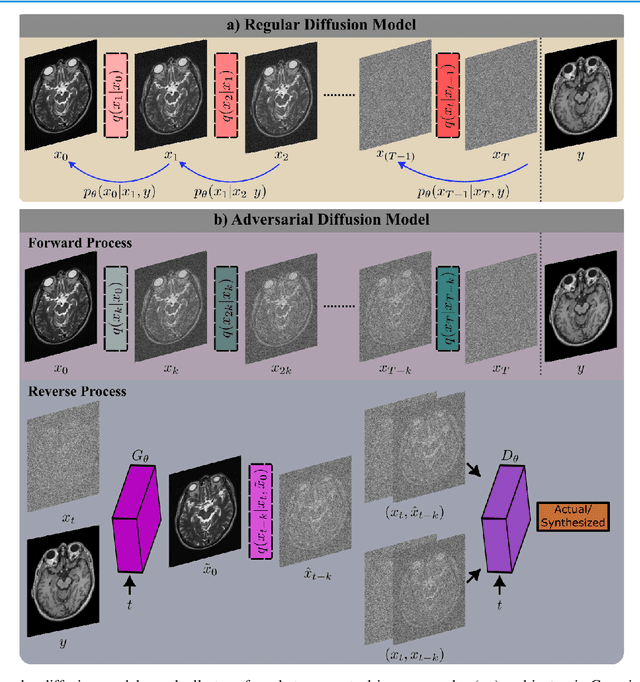
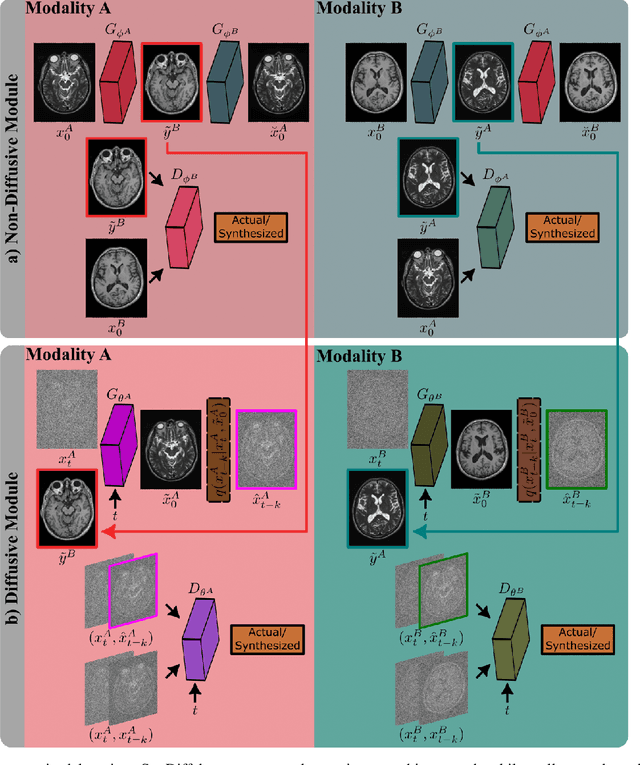


Abstract:Imputation of missing images via source-to-target modality translation can facilitate downstream tasks in medical imaging. A pervasive approach for synthesizing target images involves one-shot mapping through generative adversarial networks (GAN). Yet, GAN models that implicitly characterize the image distribution can suffer from limited sample fidelity and diversity. Here, we propose a novel method based on adversarial diffusion modeling, SynDiff, for improved reliability in medical image synthesis. To capture a direct correlate of the image distribution, SynDiff leverages a conditional diffusion process to progressively map noise and source images onto the target image. For fast and accurate image sampling during inference, large diffusion steps are coupled with adversarial projections in the reverse diffusion direction. To enable training on unpaired datasets, a cycle-consistent architecture is devised with two coupled diffusion processes to synthesize the target given source and the source given target. Extensive assessments are reported on the utility of SynDiff against competing GAN and diffusion models in multi-contrast MRI and MRI-CT translation. Our demonstrations indicate that SynDiff offers superior performance against competing baselines both qualitatively and quantitatively.
Adaptive Diffusion Priors for Accelerated MRI Reconstruction
Jul 12, 2022
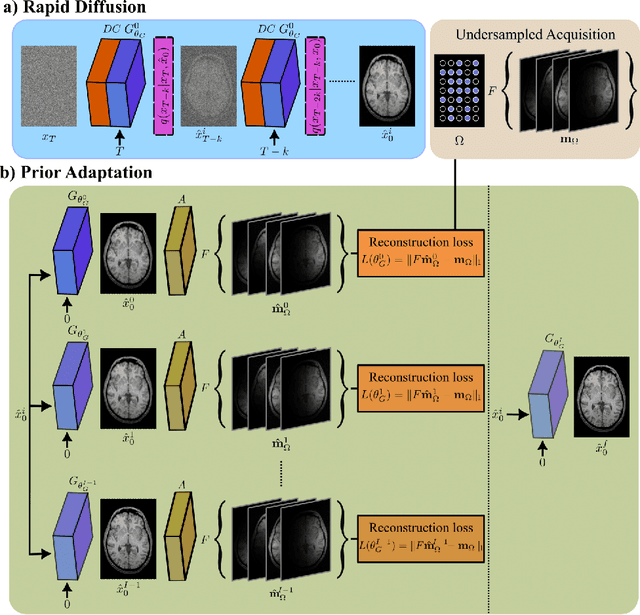
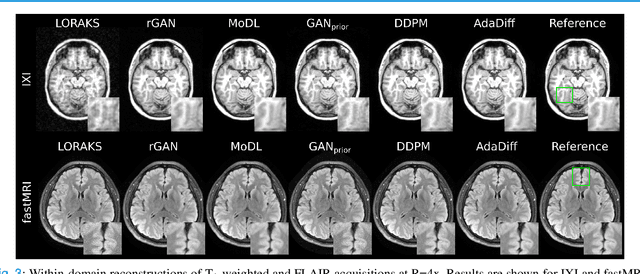
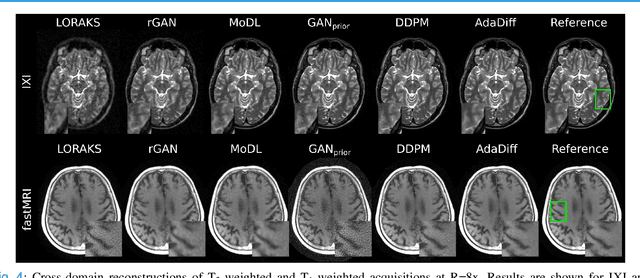
Abstract:Deep MRI reconstruction is commonly performed with conditional models that map undersampled data as input onto fully-sampled data as output. Conditional models perform de-aliasing under knowledge of the accelerated imaging operator, so they poorly generalize under domain shifts in the operator. Unconditional models are a powerful alternative that instead learn generative image priors to improve reliability against domain shifts. Recent diffusion models are particularly promising given their high representational diversity and sample quality. Nevertheless, projections through a static image prior can lead to suboptimal performance. Here we propose a novel MRI reconstruction, AdaDiff, based on an adaptive diffusion prior. To enable efficient image sampling, an adversarial mapper is introduced that enables use of large diffusion steps. A two-phase reconstruction is performed with the trained prior: a rapid-diffusion phase that produces an initial reconstruction, and an adaptation phase where the diffusion prior is updated to minimize reconstruction loss on acquired k-space data. Demonstrations on multi-contrast brain MRI clearly indicate that AdaDiff achieves superior performance to competing models in cross-domain tasks, and superior or on par performance in within-domain tasks.
TranSMS: Transformers for Super-Resolution Calibration in Magnetic Particle Imaging
Nov 03, 2021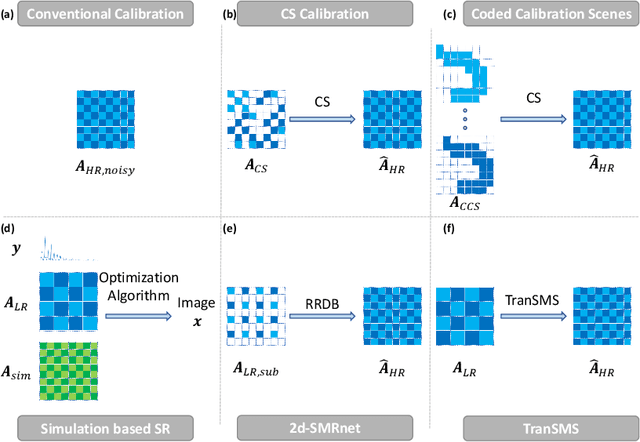
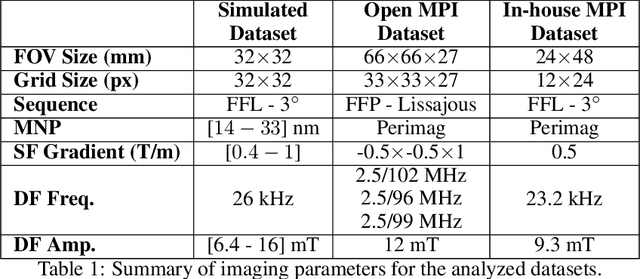
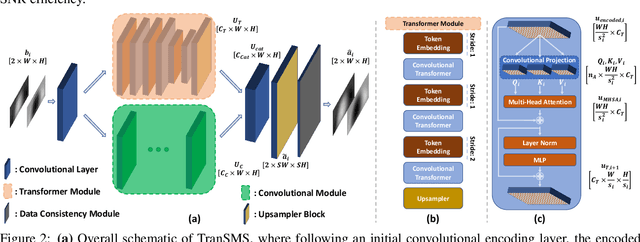

Abstract:Magnetic particle imaging (MPI) is a recent modality that offers exceptional contrast for magnetic nanoparticles (MNP) at high spatio-temporal resolution. A common procedure in MPI starts with a calibration scan to measure the system matrix (SM), which is then used to setup an inverse problem to reconstruct images of the particle distribution during subsequent scans. This calibration enables the reconstruction to sensitively account for various system imperfections. Yet time-consuming SM measurements have to be repeated under notable drifts or changes in system properties. Here, we introduce a novel deep learning approach for accelerated MPI calibration based on transformers for SM super-resolution (TranSMS). Low-resolution SM measurements are performed using large MNP samples for improved signal-to-noise ratio efficiency, and the high-resolution SM is super-resolved via a model-based deep network. TranSMS leverages a vision transformer module to capture contextual relationships in low-resolution input images, a dense convolutional module for localizing high-resolution image features, and a data-consistency module to ensure consistency to measurements. Demonstrations on simulated and experimental data indicate that TranSMS achieves significantly improved SM recovery and image reconstruction in MPI, while enabling acceleration up to 64-fold during two-dimensional calibration.
 Add to Chrome
Add to Chrome Add to Firefox
Add to Firefox Add to Edge
Add to Edge